2023届初高中英语衔接语法专题复习: 动词的时态课件(共25张PPT)
文档属性
| 名称 | 2023届初高中英语衔接语法专题复习: 动词的时态课件(共25张PPT) |

|
|
| 格式 | pptx | ||
| 文件大小 | 1.2MB | ||
| 资源类型 | 教案 | ||
| 版本资源 | 通用版 | ||
| 科目 | 英语 | ||
| 更新时间 | 2022-08-29 00:00:00 | ||
图片预览

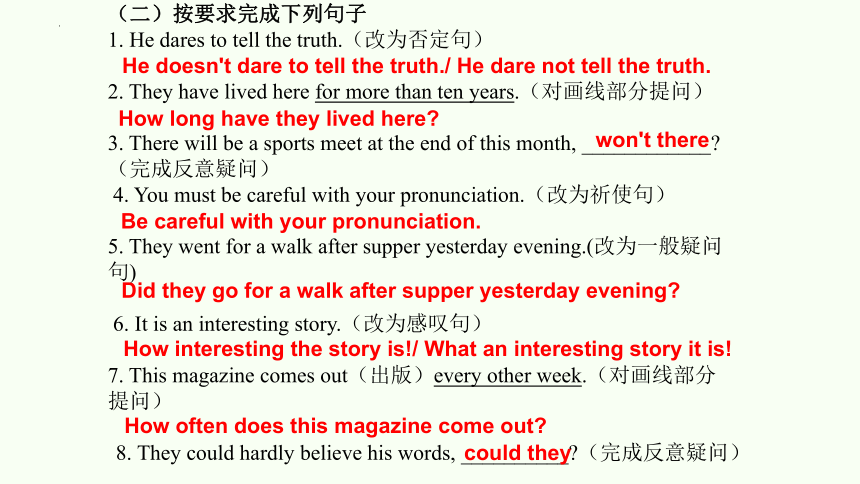
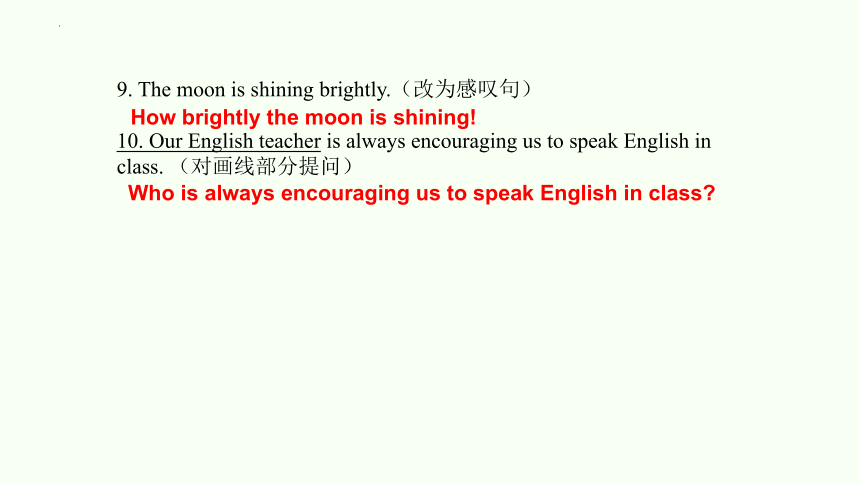
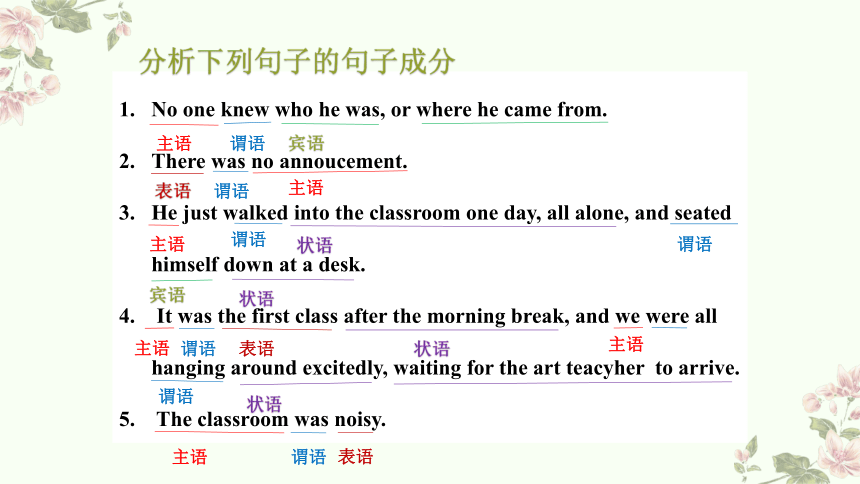
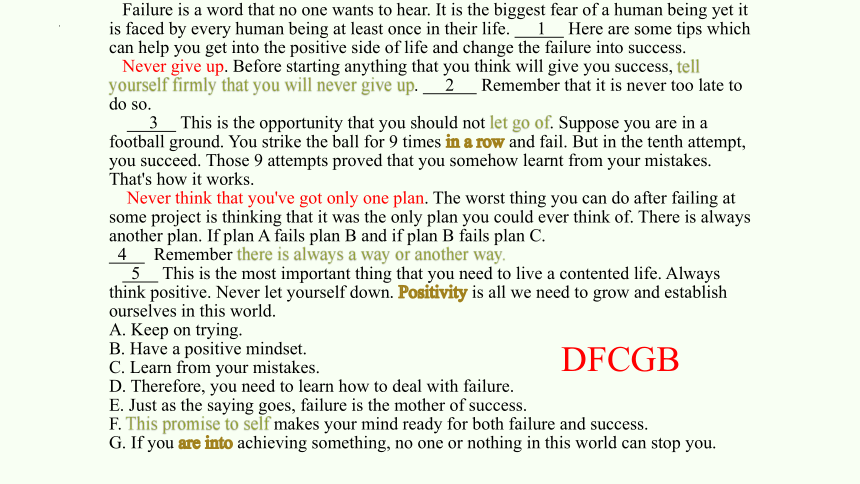
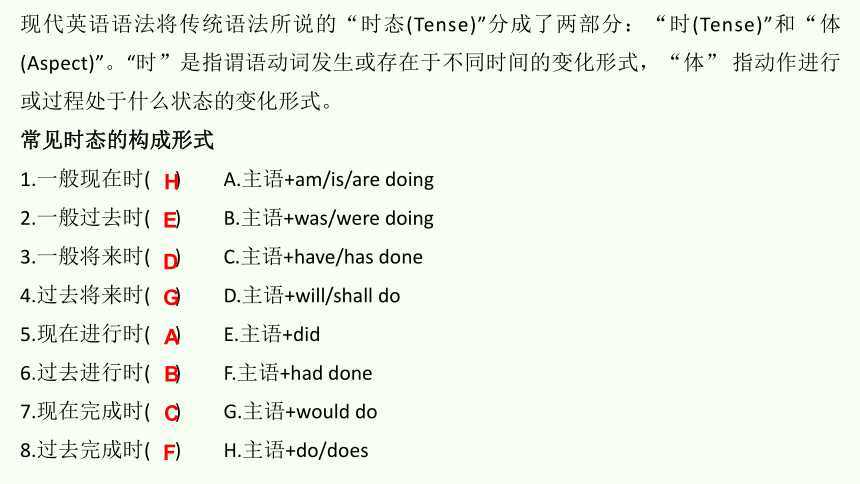

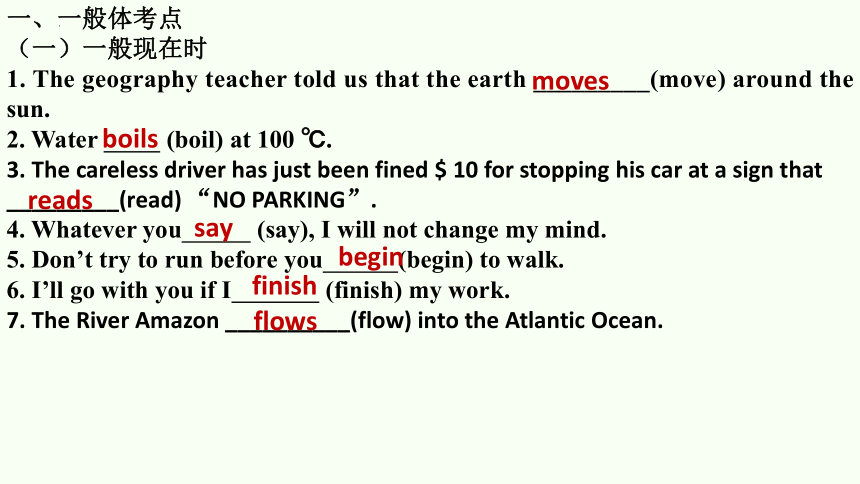
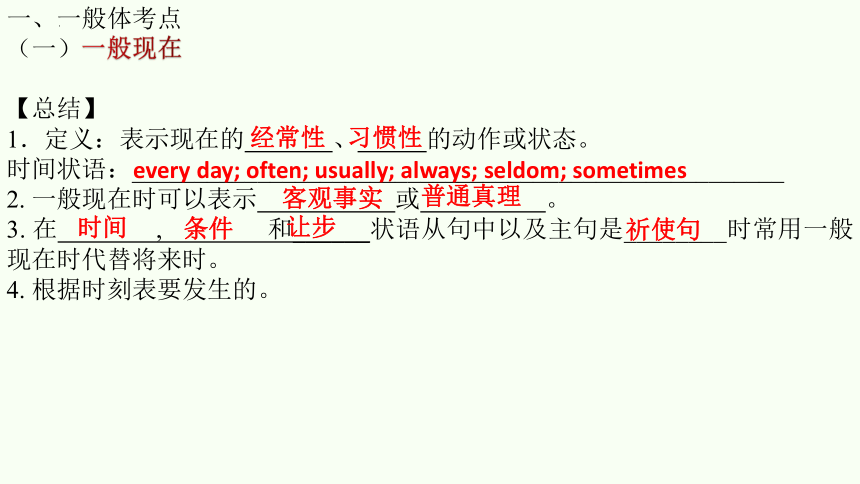
文档简介
(共25张PPT)
第五节 动词的时态
(二)按要求完成下列句子
1. He dares to tell the truth.(改为否定句)
2. They have lived here for more than ten years.(对画线部分提问)
3. There will be a sports meet at the end of this month, ____________ (完成反意疑问)
4. You must be careful with your pronunciation.(改为祈使句)
5. They went for a walk after supper yesterday evening.(改为一般疑问句)
6. It is an interesting story.(改为感叹句)
7. This magazine comes out(出版)every other week.(对画线部分提问)
8. They could hardly believe his words, __________ (完成反意疑问)
He doesn't dare to tell the truth./ He dare not tell the truth.
How long have they lived here
won't there
Be careful with your pronunciation.
Did they go for a walk after supper yesterday evening
How interesting the story is!/ What an interesting story it is!
How often does this magazine come out
could they
9. The moon is shining brightly.(改为感叹句)
10. Our English teacher is always encouraging us to speak English in class. (对画线部分提问)
How brightly the moon is shining!
Who is always encouraging us to speak English in class
No one knew who he was, or where he came from.
There was no annoucement.
He just walked into the classroom one day, all alone, and seated himself down at a desk.
It was the first class after the morning break, and we were all hanging around excitedly, waiting for the art teacyher to arrive.
The classroom was noisy.
主语
谓语
宾语
主语
谓语
表语
主语
谓语
状语
谓语
宾语
状语
主语
谓语
表语
状语
主语
谓语
状语
主语
谓语
表语
分析下列句子的句子成分
Failure is a word that no one wants to hear. It is the biggest fear of a human being yet it is faced by every human being at least once in their life. 1 Here are some tips which can help you get into the positive side of life and change the failure into success.
Never give up. Before starting anything that you think will give you success, tell yourself firmly that you will never give up. 2 Remember that it is never too late to do so.
3 This is the opportunity that you should not let go of. Suppose you are in a football ground. You strike the ball for 9 times in a row and fail. But in the tenth attempt, you succeed. Those 9 attempts proved that you somehow learnt from your mistakes. That's how it works.
Never think that you've got only one plan. The worst thing you can do after failing at some project is thinking that it was the only plan you could ever think of. There is always another plan. If plan A fails plan B and if plan B fails plan C.
4 Remember there is always a way or another way.
5 This is the most important thing that you need to live a contented life. Always think positive. Never let yourself down. Positivity is all we need to grow and establish ourselves in this world.
A. Keep on trying.
B. Have a positive mindset.
C. Learn from your mistakes.
D. Therefore, you need to learn how to deal with failure.
E. Just as the saying goes, failure is the mother of success.
F. This promise to self makes your mind ready for both failure and success.
G. If you are into achieving something, no one or nothing in this world can stop you.
DFCGB
现代英语语法将传统语法所说的“时态(Tense)”分成了两部分:“时(Tense)”和“体(Aspect)”。“时”是指谓语动词发生或存在于不同时间的变化形式,“体” 指动作进行或过程处于什么状态的变化形式。
常见时态的构成形式
一般现在时( ) A.主语+am/is/are doing
一般过去时( ) B.主语+was/were doing
一般将来时( ) C.主语+have/has done
过去将来时( ) D.主语+will/shall do
现在进行时( ) E.主语+did
过去进行时( ) F.主语+had done
现在完成时( ) G.主语+would do
过去完成时( ) H.主语+do/does
H
E
D
G
A
B
C
F
一般现在时
主语+do/does
一、一般体考点
(一)一般现在时
1. The geography teacher told us that the earth _________(move) around the sun.
2. Water (boil) at 100 ℃.
3. The careless driver has just been fined $ 10 for stopping his car at a sign that _________(read) “NO PARKING”.
4. Whatever you (say), I will not change my mind.
5. Don’t try to run before you (begin) to walk.
6. I’ll go with you if I (finish) my work.
7. The River Amazon __________(flow) into the Atlantic Ocean.
moves
boils
finish
say
begin
reads
flows
一、一般体考点
(一)一般现在
【总结】
1.定义:表示现在的 、 的动作或状态。
时间状语:____________________________________________________
2. 一般现在时可以表示 或 。
3. 在 , 和______状语从句中以及主句是________时常用一般现在时代替将来时。
4. 根据时刻表要发生的。
经常性
习惯性
every day; often; usually; always; seldom; sometimes
时间
条件
祈使句
客观事实
普通真理
让步
(二)一般过去时
1. --- Nancy is not coming tonight. --- But she (promise)!
2. My uncle ____ (marry) until he was forty-five.
3. --- You haven’t said a word about my new car, Brenda. Do you like it
--- I’m sorry I (not say) anything about it sooner. I certainly think it’s pretty on you.
4. --- Come on in, Peter. I want to show you something.
--- Oh, how nice of you! I never (think) you (be) going to bring me a gift.
5. --- Your phone number again! I (not catch) it. --- It’s 9598442.
【总结】
定义:①过去某一时间发生的动作或所处的状态。②含有“刚才,在过去”之意,暗示现在已经不这样。
时间状语:_____________________________________________________________
promised
were
thought
didn’t say
didn’t marry
didn’t catch
then; at that time; just now; three days ago; yesterday; when 或 while 引导的表示过去的时间状语从句
特殊句型:
It is time that sb. did sth.
“是时候该……了"
would rather sb. did sth.
“宁愿某人做某事”
It is time you to bed.
I would rather you __ do anything for the time being.
went
didn’t
一般将来时:
will do
be going to do
be doing
be about to do
be to do
一般现在时表将来
将来时 用法 例句
1 will + 动词原形 表示将来发生的动作或存在的状态 (事物固有的属性或必然趋势) My sister ten next year.
2 be going to +动词原形 1. 口语中表示“打 算、计划”做某事; 2. 根据现在的迹象,对未来进行推断; 3. 用于条件句中,表将来;而will 不行 It clear up.
We have a party tonight.
If you come to my house, you’d better phone me first.
3 be + doing 进行时表示将来 go; come; start; begin; move; leave; arrive; stay 等词可用进行时表示按照计划或即将发生的动作 He to the south.
they for Europe
(三)一般将来时
will be
are going to
are going to
is going to
Are leaving
is moving
4 be about to +动词原形 表示安排或计划中的马上就要发生的动作,后面一般不跟__________ I leave when the bell rang.
The meeting close.
5 be to + 动词原形 表示按照计划或安排要做的事 We meet at the school gate at noon.
6 一般现在时表示将来 一些起止的动词 come; go; leave; arrive; fly; return; start; begin; close; end; stop 等,用来表示______上或_________上早就定好的事情 The meeting at five o’clock.(start)
The plane at ten this evening.(leave)
具体时间
was about to
is about to
are to
时刻表
日程安排
starts
leaves
【总结】
定义:_______某一时刻要发生的动作或所处的状态。shall只限于第一人称,主要见于英国英语,现在的趋势是第一、二、三人称的单复数形式均用will表示。在口语中,shall和will常缩写成“'ll”,紧接在主语之后。其否定式shall not和will not常简略为shan't和won't。
e.g. Which paragraph shall I read first?
时间状语:
_________________________________________________________
将来
soon; next week; tomorrow 等
2. be to + 动词原形的用法:
(1) You are to do your homework before you watch TV. = “必须“
(2) You are to report the police. = “应该”
(3) If we are to be there before 10, we’ll have to go now. = “打算;想”
(4) What are we to do next?用于第一人称疑问句中,表示 意见。
(5) You are not to smoke in the room. = “禁止”,用于 句中
(6) The news is to be found in the evening newspaper. = “可以;可能”
have to/ must
ought to/ should
intend/ want
征求对方
mustn’t
否定
may/ can
【题组训练】
1. If a man (succeed), he must work as hard as he can.
2. In such dry weather, the flowers will have to be watered if they
(survive).
3. Look at these clouds. It (rain).
4.
--- You’ve left the light on. --- Oh, so I have. I (go) and turn it off.
is to succeed
are to survive
is going to
will go
(四)过去将来时
1. My brother (tell) me that he back on Saturday.
2. No one (know) which country (hold) the next Olympic Games.
【总结】
定义:从______某时看_________发生的事或存在的状态。时间的出发点是_____。该时态常用于________或__________中。而主句的谓语动词常常是______时间或有____________。
told
would be
knew
would hold
过去
将要
过去
间接引语
过去
过去完成时
宾语从句
进行时态:
现在进行时:is/am/are doing
过去进行时:was/were doing
现在进行时: 或 正在发生的动作或存在的状态。
说话时
现阶段
过去进行时: 某个时刻或阶段正在发生的动作或存在的状态。
过去
二、进行体考点
1. As she (read) the newspaper, Grammy (fall) asleep.
2. The reporter said that the UFO (travel) east to west when he (see) it.
3. He always (think) of others first.
4. He always (make) the same mistake.
5. --- Have you moved into the new house. --- Not yet. The rooms (paint).
6. Shirley (write) a book about China last year but I don’t know whether she has finished it.
7. Selecting a mobile phone for personal use is not easy task because technology (change) so rapidly.
8. I don’t really work here. I just (help) out until the new secretary arrives.
was reading
fell
was travelling
saw
is thinking
is making
are being painted
was writing
changes/is changing
am helping
【总结】
1. 定义
1)现在进行时: 或 正在发生的动作或存在的状态。
2)过去进行时: 某个时刻或阶段正在发生的动作或存在的状态。
2. 时间状语
1)现在进行时:_________________________________________________
2)过去进行时:_________________________________________________
3. 一个长动作为背景,被一个短动作打断,长动作用 体,短动作用 体。
4. 进行体表示反复出现或习惯性动作,含有 、厌恶、 等情绪。常与 等连用。
5. 进行体表示动作的 性、 性。
6. 如果句中有______,_________等提示语,其后应考虑使用现在进行时。
Listen! Han Mei an English song in the classroom.(sing)
说话时
现阶段
过去
now; right now等
at this time yesterday等
进行
一般
赞赏
遗憾
always; continually; constantly
未完成
暂时
look
listen
is singing
★下面四类动词不宜用现在进行时:
1. 表示心理状态、情感的动词,如
____________________________ ____等;
2. 表存在的状态的动词,如
__________________________________等;
3. 表示一时性非延续性动作的动词,如
_______________________等;
4. 表示感官的动词,如
_____________________________________________等。
like,love,hate,care,remember,believe,need
appear,exist,lie,remain,seem
allow,accept,permit
see,hear,notice,feel,smell,sound,taste,look
三、完成体考点(一)现在完成时
1. In the past few years, great changes (take) place in my hometown.
2. He (be) busy writing a book recently.
3. He (write) 8 books so far.
4. the concert (start) yet (Is the concert on now )
5. I never (see) the film. (I don’t know the film now)
6. I will not believe you unless I (see) it with my own eyes.
7 I will go with you as soon as I (finish) my work.
8. 改错 1) He has come to Beijing since last year.
______________________________________________
2) He has joined the army for 3 years.
_______________________________________________
三、完成体考点(一)现在完成时
1. In the past few years, great changes (take) place in my hometown.
2. He (be) busy writing a book recently.
3. He (write) 8 books so far.
4. the concert (start) yet (Is the concert on now )
5. I never (see) the film. (I don’t know the film now)
6. I will not believe you unless I (see) it with my own eyes.
7 I will go with you as soon as I (finish) my work.
8. 改错 1) He has come to Beijing since last year.
______________________________________________
2) He has joined the army for 3 years.
_______________________________________________
have taken
has been
has written
Has started
have seen
have seen
have finished
He has been / lived in Beijing since last year.
He came to Beijing last year.
He has served in the army for 3 years./ He joined the army 3 years ago. / He has been a soldier for 3 years./ It is / has been three years since he joined the army.
【总结】
1. 定义和时间状语:
1)表示一个动作或状态开始于 ,持续到 ,(也许还将持续下去)。
时间状语:_________________________________________________
2.) 一个发生在 的事情对 产生的影响。
时间状语:_____________________________________________________
2. 在 、 或 状语从句中,表示 的动作
3. 瞬间动词用完成时态不可以接一段时间的状语
瞬间动词有:___________________________________________________________________
_____________________________________________________________________________
4. This is +形容词最高级+that…结构,that从句要用现在完成时。
This is the best film that I (ever see).
过去
现在
过去
现在
lately; recently; in the last / past few years, since then; up to now; so far 等
already; just; yet; never; before 等
条件
时间
让步
将来某时以前已经完成
come; go; get to / reach / arrive in / arrive at; leave; buy; sell; open; close; get up; join / take part in; begin / start; return; give; borrow; lend; become; turn; bring; take; die; finish / end; receive / hear form; marry; break; lose; jump
have ever seen
第五节 动词的时态
(二)按要求完成下列句子
1. He dares to tell the truth.(改为否定句)
2. They have lived here for more than ten years.(对画线部分提问)
3. There will be a sports meet at the end of this month, ____________ (完成反意疑问)
4. You must be careful with your pronunciation.(改为祈使句)
5. They went for a walk after supper yesterday evening.(改为一般疑问句)
6. It is an interesting story.(改为感叹句)
7. This magazine comes out(出版)every other week.(对画线部分提问)
8. They could hardly believe his words, __________ (完成反意疑问)
He doesn't dare to tell the truth./ He dare not tell the truth.
How long have they lived here
won't there
Be careful with your pronunciation.
Did they go for a walk after supper yesterday evening
How interesting the story is!/ What an interesting story it is!
How often does this magazine come out
could they
9. The moon is shining brightly.(改为感叹句)
10. Our English teacher is always encouraging us to speak English in class. (对画线部分提问)
How brightly the moon is shining!
Who is always encouraging us to speak English in class
No one knew who he was, or where he came from.
There was no annoucement.
He just walked into the classroom one day, all alone, and seated himself down at a desk.
It was the first class after the morning break, and we were all hanging around excitedly, waiting for the art teacyher to arrive.
The classroom was noisy.
主语
谓语
宾语
主语
谓语
表语
主语
谓语
状语
谓语
宾语
状语
主语
谓语
表语
状语
主语
谓语
状语
主语
谓语
表语
分析下列句子的句子成分
Failure is a word that no one wants to hear. It is the biggest fear of a human being yet it is faced by every human being at least once in their life. 1 Here are some tips which can help you get into the positive side of life and change the failure into success.
Never give up. Before starting anything that you think will give you success, tell yourself firmly that you will never give up. 2 Remember that it is never too late to do so.
3 This is the opportunity that you should not let go of. Suppose you are in a football ground. You strike the ball for 9 times in a row and fail. But in the tenth attempt, you succeed. Those 9 attempts proved that you somehow learnt from your mistakes. That's how it works.
Never think that you've got only one plan. The worst thing you can do after failing at some project is thinking that it was the only plan you could ever think of. There is always another plan. If plan A fails plan B and if plan B fails plan C.
4 Remember there is always a way or another way.
5 This is the most important thing that you need to live a contented life. Always think positive. Never let yourself down. Positivity is all we need to grow and establish ourselves in this world.
A. Keep on trying.
B. Have a positive mindset.
C. Learn from your mistakes.
D. Therefore, you need to learn how to deal with failure.
E. Just as the saying goes, failure is the mother of success.
F. This promise to self makes your mind ready for both failure and success.
G. If you are into achieving something, no one or nothing in this world can stop you.
DFCGB
现代英语语法将传统语法所说的“时态(Tense)”分成了两部分:“时(Tense)”和“体(Aspect)”。“时”是指谓语动词发生或存在于不同时间的变化形式,“体” 指动作进行或过程处于什么状态的变化形式。
常见时态的构成形式
一般现在时( ) A.主语+am/is/are doing
一般过去时( ) B.主语+was/were doing
一般将来时( ) C.主语+have/has done
过去将来时( ) D.主语+will/shall do
现在进行时( ) E.主语+did
过去进行时( ) F.主语+had done
现在完成时( ) G.主语+would do
过去完成时( ) H.主语+do/does
H
E
D
G
A
B
C
F
一般现在时
主语+do/does
一、一般体考点
(一)一般现在时
1. The geography teacher told us that the earth _________(move) around the sun.
2. Water (boil) at 100 ℃.
3. The careless driver has just been fined $ 10 for stopping his car at a sign that _________(read) “NO PARKING”.
4. Whatever you (say), I will not change my mind.
5. Don’t try to run before you (begin) to walk.
6. I’ll go with you if I (finish) my work.
7. The River Amazon __________(flow) into the Atlantic Ocean.
moves
boils
finish
say
begin
reads
flows
一、一般体考点
(一)一般现在
【总结】
1.定义:表示现在的 、 的动作或状态。
时间状语:____________________________________________________
2. 一般现在时可以表示 或 。
3. 在 , 和______状语从句中以及主句是________时常用一般现在时代替将来时。
4. 根据时刻表要发生的。
经常性
习惯性
every day; often; usually; always; seldom; sometimes
时间
条件
祈使句
客观事实
普通真理
让步
(二)一般过去时
1. --- Nancy is not coming tonight. --- But she (promise)!
2. My uncle ____ (marry) until he was forty-five.
3. --- You haven’t said a word about my new car, Brenda. Do you like it
--- I’m sorry I (not say) anything about it sooner. I certainly think it’s pretty on you.
4. --- Come on in, Peter. I want to show you something.
--- Oh, how nice of you! I never (think) you (be) going to bring me a gift.
5. --- Your phone number again! I (not catch) it. --- It’s 9598442.
【总结】
定义:①过去某一时间发生的动作或所处的状态。②含有“刚才,在过去”之意,暗示现在已经不这样。
时间状语:_____________________________________________________________
promised
were
thought
didn’t say
didn’t marry
didn’t catch
then; at that time; just now; three days ago; yesterday; when 或 while 引导的表示过去的时间状语从句
特殊句型:
It is time that sb. did sth.
“是时候该……了"
would rather sb. did sth.
“宁愿某人做某事”
It is time you to bed.
I would rather you __ do anything for the time being.
went
didn’t
一般将来时:
will do
be going to do
be doing
be about to do
be to do
一般现在时表将来
将来时 用法 例句
1 will + 动词原形 表示将来发生的动作或存在的状态 (事物固有的属性或必然趋势) My sister ten next year.
2 be going to +动词原形 1. 口语中表示“打 算、计划”做某事; 2. 根据现在的迹象,对未来进行推断; 3. 用于条件句中,表将来;而will 不行 It clear up.
We have a party tonight.
If you come to my house, you’d better phone me first.
3 be + doing 进行时表示将来 go; come; start; begin; move; leave; arrive; stay 等词可用进行时表示按照计划或即将发生的动作 He to the south.
they for Europe
(三)一般将来时
will be
are going to
are going to
is going to
Are leaving
is moving
4 be about to +动词原形 表示安排或计划中的马上就要发生的动作,后面一般不跟__________ I leave when the bell rang.
The meeting close.
5 be to + 动词原形 表示按照计划或安排要做的事 We meet at the school gate at noon.
6 一般现在时表示将来 一些起止的动词 come; go; leave; arrive; fly; return; start; begin; close; end; stop 等,用来表示______上或_________上早就定好的事情 The meeting at five o’clock.(start)
The plane at ten this evening.(leave)
具体时间
was about to
is about to
are to
时刻表
日程安排
starts
leaves
【总结】
定义:_______某一时刻要发生的动作或所处的状态。shall只限于第一人称,主要见于英国英语,现在的趋势是第一、二、三人称的单复数形式均用will表示。在口语中,shall和will常缩写成“'ll”,紧接在主语之后。其否定式shall not和will not常简略为shan't和won't。
e.g. Which paragraph shall I read first?
时间状语:
_________________________________________________________
将来
soon; next week; tomorrow 等
2. be to + 动词原形的用法:
(1) You are to do your homework before you watch TV. = “必须“
(2) You are to report the police. = “应该”
(3) If we are to be there before 10, we’ll have to go now. = “打算;想”
(4) What are we to do next?用于第一人称疑问句中,表示 意见。
(5) You are not to smoke in the room. = “禁止”,用于 句中
(6) The news is to be found in the evening newspaper. = “可以;可能”
have to/ must
ought to/ should
intend/ want
征求对方
mustn’t
否定
may/ can
【题组训练】
1. If a man (succeed), he must work as hard as he can.
2. In such dry weather, the flowers will have to be watered if they
(survive).
3. Look at these clouds. It (rain).
4.
--- You’ve left the light on. --- Oh, so I have. I (go) and turn it off.
is to succeed
are to survive
is going to
will go
(四)过去将来时
1. My brother (tell) me that he back on Saturday.
2. No one (know) which country (hold) the next Olympic Games.
【总结】
定义:从______某时看_________发生的事或存在的状态。时间的出发点是_____。该时态常用于________或__________中。而主句的谓语动词常常是______时间或有____________。
told
would be
knew
would hold
过去
将要
过去
间接引语
过去
过去完成时
宾语从句
进行时态:
现在进行时:is/am/are doing
过去进行时:was/were doing
现在进行时: 或 正在发生的动作或存在的状态。
说话时
现阶段
过去进行时: 某个时刻或阶段正在发生的动作或存在的状态。
过去
二、进行体考点
1. As she (read) the newspaper, Grammy (fall) asleep.
2. The reporter said that the UFO (travel) east to west when he (see) it.
3. He always (think) of others first.
4. He always (make) the same mistake.
5. --- Have you moved into the new house. --- Not yet. The rooms (paint).
6. Shirley (write) a book about China last year but I don’t know whether she has finished it.
7. Selecting a mobile phone for personal use is not easy task because technology (change) so rapidly.
8. I don’t really work here. I just (help) out until the new secretary arrives.
was reading
fell
was travelling
saw
is thinking
is making
are being painted
was writing
changes/is changing
am helping
【总结】
1. 定义
1)现在进行时: 或 正在发生的动作或存在的状态。
2)过去进行时: 某个时刻或阶段正在发生的动作或存在的状态。
2. 时间状语
1)现在进行时:_________________________________________________
2)过去进行时:_________________________________________________
3. 一个长动作为背景,被一个短动作打断,长动作用 体,短动作用 体。
4. 进行体表示反复出现或习惯性动作,含有 、厌恶、 等情绪。常与 等连用。
5. 进行体表示动作的 性、 性。
6. 如果句中有______,_________等提示语,其后应考虑使用现在进行时。
Listen! Han Mei an English song in the classroom.(sing)
说话时
现阶段
过去
now; right now等
at this time yesterday等
进行
一般
赞赏
遗憾
always; continually; constantly
未完成
暂时
look
listen
is singing
★下面四类动词不宜用现在进行时:
1. 表示心理状态、情感的动词,如
____________________________ ____等;
2. 表存在的状态的动词,如
__________________________________等;
3. 表示一时性非延续性动作的动词,如
_______________________等;
4. 表示感官的动词,如
_____________________________________________等。
like,love,hate,care,remember,believe,need
appear,exist,lie,remain,seem
allow,accept,permit
see,hear,notice,feel,smell,sound,taste,look
三、完成体考点(一)现在完成时
1. In the past few years, great changes (take) place in my hometown.
2. He (be) busy writing a book recently.
3. He (write) 8 books so far.
4. the concert (start) yet (Is the concert on now )
5. I never (see) the film. (I don’t know the film now)
6. I will not believe you unless I (see) it with my own eyes.
7 I will go with you as soon as I (finish) my work.
8. 改错 1) He has come to Beijing since last year.
______________________________________________
2) He has joined the army for 3 years.
_______________________________________________
三、完成体考点(一)现在完成时
1. In the past few years, great changes (take) place in my hometown.
2. He (be) busy writing a book recently.
3. He (write) 8 books so far.
4. the concert (start) yet (Is the concert on now )
5. I never (see) the film. (I don’t know the film now)
6. I will not believe you unless I (see) it with my own eyes.
7 I will go with you as soon as I (finish) my work.
8. 改错 1) He has come to Beijing since last year.
______________________________________________
2) He has joined the army for 3 years.
_______________________________________________
have taken
has been
has written
Has started
have seen
have seen
have finished
He has been / lived in Beijing since last year.
He came to Beijing last year.
He has served in the army for 3 years./ He joined the army 3 years ago. / He has been a soldier for 3 years./ It is / has been three years since he joined the army.
【总结】
1. 定义和时间状语:
1)表示一个动作或状态开始于 ,持续到 ,(也许还将持续下去)。
时间状语:_________________________________________________
2.) 一个发生在 的事情对 产生的影响。
时间状语:_____________________________________________________
2. 在 、 或 状语从句中,表示 的动作
3. 瞬间动词用完成时态不可以接一段时间的状语
瞬间动词有:___________________________________________________________________
_____________________________________________________________________________
4. This is +形容词最高级+that…结构,that从句要用现在完成时。
This is the best film that I (ever see).
过去
现在
过去
现在
lately; recently; in the last / past few years, since then; up to now; so far 等
already; just; yet; never; before 等
条件
时间
让步
将来某时以前已经完成
come; go; get to / reach / arrive in / arrive at; leave; buy; sell; open; close; get up; join / take part in; begin / start; return; give; borrow; lend; become; turn; bring; take; die; finish / end; receive / hear form; marry; break; lose; jump
have ever seen
同课章节目录
- 词法
- 名词
- 动词和动词短语
- 动词语态
- 动词时态
- 助动词和情态动词
- 非谓语动词
- 冠词
- 代词
- 数词和量词
- 形容词副词及其比较等级
- 介词和介词短语
- 连词和感叹词
- 构词法
- 相似、相近词比较
- 句法
- 陈述句
- 一般疑问句和否定疑问句
- 特殊疑问句及选择疑问句
- 反意疑问句
- 存在句(There be句型)
- 宾语从句
- 定语从句
- 状语从句
- 主谓一致问题
- 简单句
- 并列句
- 复合句
- 主谓一致
- 主、表语从句
- 名词性从句
- 直接引语和间接引语
- 虚拟语气
- 感叹句
- 强调句
- 倒装句
- 祈使句
- 句子的成分
- 句子的分类
- 题型专区
- 单项选择部分
- 易错题
- 完形填空
- 阅读理解
- 词汇练习
- 听说训练
- 句型转换
- 补全对话
- 短文改错
- 翻译
- 书面表达
- 任务型阅读
- 语法填空
- 其他资料
